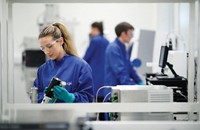Advertisement
Grab your lab coat. Let's get started
Welcome!
Welcome!
Create an account below to get 6 C&EN articles per month, receive newsletters and more - all free.
It seems this is your first time logging in online. Please enter the following information to continue.
As an ACS member you automatically get access to this site. All we need is few more details to create your reading experience.
Not you? Sign in with a different account.
Not you? Sign in with a different account.
ERROR 1
ERROR 1
ERROR 2
ERROR 2
ERROR 2
ERROR 2
ERROR 2
Password and Confirm password must match.
If you have an ACS member number, please enter it here so we can link this account to your membership. (optional)
ERROR 2
ACS values your privacy. By submitting your information, you are gaining access to C&EN and subscribing to our weekly newsletter. We use the information you provide to make your reading experience better, and we will never sell your data to third party members.
Environment
Future Factory Takes Flight
Europe-based group targets more efficient processes
by Ann M. Thayer
June 15, 2009
| A version of this story appeared in
Volume 87, Issue 24

Flexible, fast, and future are the watchwords of the new F3 Factory initiative launched by a group of 12 companies, seven universities, and six research institutes from nine European countries. Funded largely by the European Union, the consortium is looking to build a facility where it will develop more efficient and sustainable chemical processes.
The launch of the initiative marks the first time that leading European chemical companies have crossed competitive boundaries to collaborate on such a large scale, according to Achim Noack, managing director of Bayer Technology Services. The need for efficiency gains, along with faster and more flexible production methods, is being driven by climate change, economic concerns, and rising raw material costs, the partners say.
In addition to the Bayer subsidiary, which is coordinating the four-year, $42 million program, companies involved include Arkema, AstraZeneca, BASF, Evonik Industries, Procter & Gamble, and Rhodia.
The group will apply the principles of process intensification and continuous processing. Initial goals include building a modular continuous-flow plant for making existing products that will demonstrate the feasibility of the F3 Factory concept.
The European chemical industry could reduce its annual costs by about $5.25 billion by switching to the more economical and sustainable F3 Factory concept while opening up new markets, the consortium believes.
The group will develop solvent-free polymers, custom-tailored surfactants, high-value-added building blocks and intermediates for pharmaceuticals, and innovative materials based on renewable feedstocks. A development center will be built at the Chempark industrial site in Leverkusen, Germany.
As an industry, government, and academic alliance focused on sustainability, the effort is "quite impressive," says Joel A. Tickner, associate professor of community health and sustainability at the University of Massachusetts, Lowell. "In the U.S., there's nothing equivalent, where there is a clear research agenda for the nation with very strong social goals that involves collaboration among multiple institutions."
Going Green
- To read more about other sustainable technologies, go to www.cen-online.org/sustainability/sustainability.html.




Join the conversation
Contact the reporter
Submit a Letter to the Editor for publication
Engage with us on Twitter